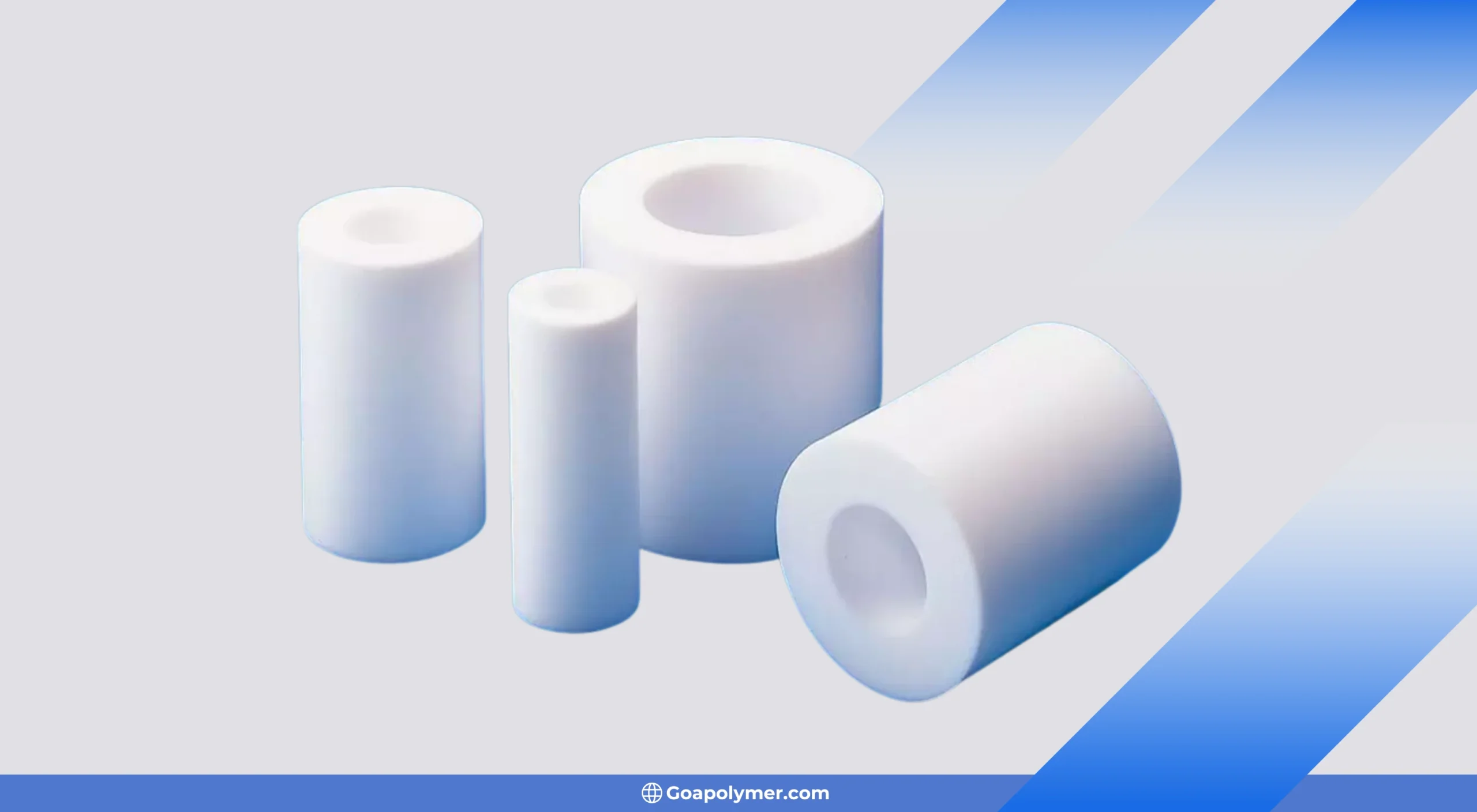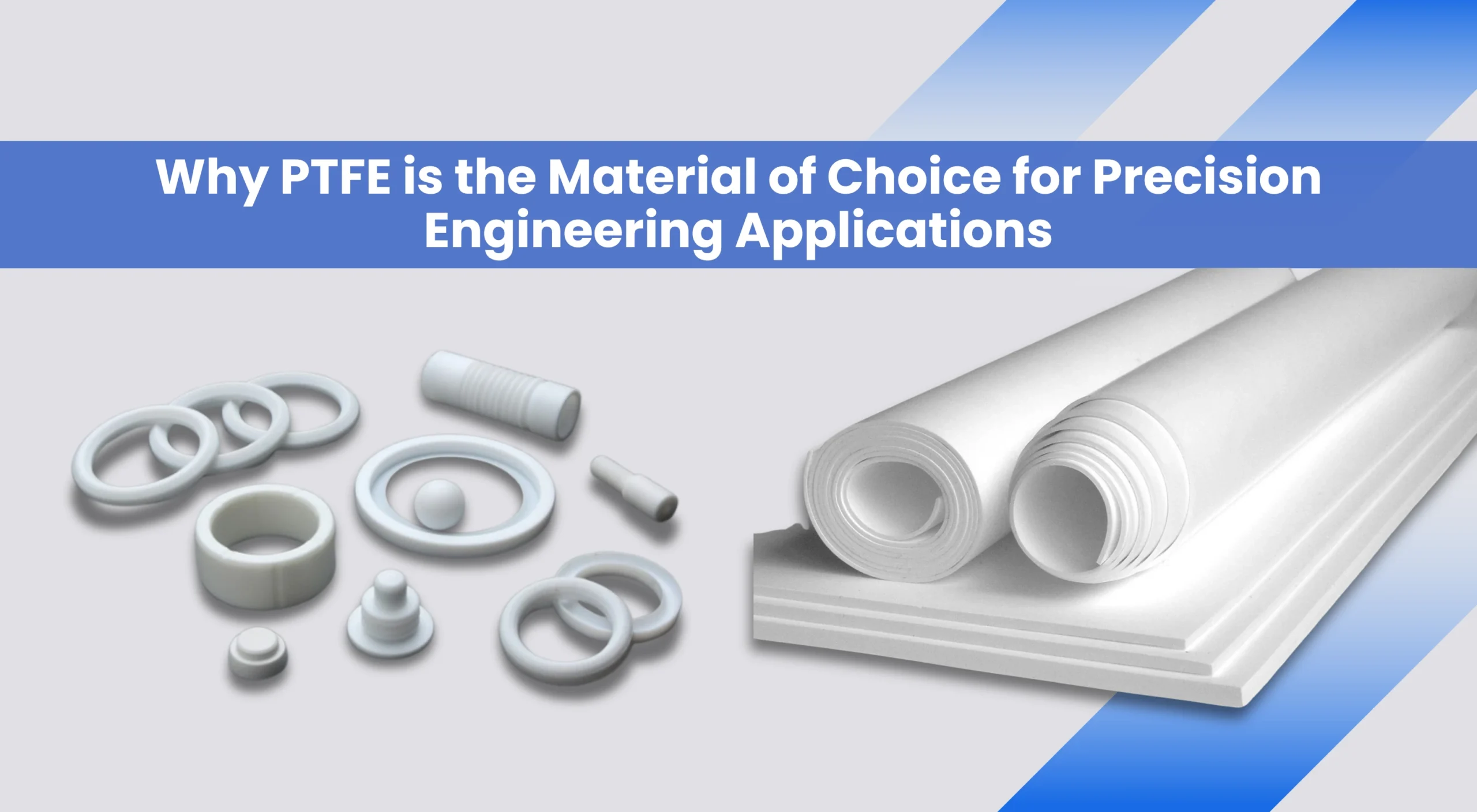Precision engineering requires materials that can withstand the most demanding operating environments. The core requirements for precision engineering consist of accuracy and reliability. Engineers and manufacturers worldwide choose PTFE (Polytetrafluoroethylene) as their top material today. Scientists recognize PTFE Gasket for its exceptional properties. The material withstands high temperatures well. It also resists chemical breakdown and wear from friction. Its properties make it a trusted choice for industries such as aerospace and electronics.
In this blog, we will guide you on why PTFE is the top choice product for precision engineering. We’ll look at its benefits, common uses, and why it’s still the favorite in modern engineering.
What is PTFE Material?
Polytetrafluoroethylene (PTFE) represents a synthetic fluoropolymer that consists of tetrafluoroethylene units. This material demonstrates chemical stability while withstanding high temperature conditions. The common household items with PTFE components include non-stick cookware. But its applications extend beyond the kitchen. PTFE holds significant value in precision engineering.
This material excels in tough environments. PTFE offers unmatched reliability in aerospace systems, electrical insulation, and medical devices. No other material can match its performance. Precision engineering revolves around accuracy, robustness, and safety. The selection of materials is fundamental to the picture. The very essence of PTFE lies in:
- Withstanding resistance and abrasion under severe mechanical stress.
- Surviving extremes of temperature from hocks to suberations.
- Remaining unreactive to most chemicals allows for their safe use in diverse industries.
- Offering low-friction properties that increase efficiency and reduce energy loss.
- These are among the few materials that engineers value greatly for their versatility.
Key Properties of PTFE That Make It Stand Out
PTFE offers significant benefits in industrial applications and is notably superior to other plastics. PTFE has unique properties that make it essential in precision engineering. Let us look at some key properties that make PTFE unique.
High Temperature Resistance
PTFE can handle very high temperatures. It doesn’t lose strength or shape. The material can handle high temperatures for short periods. This material suits aerospace engines and industrial machines as well as automotive systems. The material can be easily damaged by heat in these areas. This property allows PTFE to work well for a long time, even in extreme heat.
- Chemical Resistance
PTFE resists most industrial chemicals. Strong acids, along with bases and solvents, are part of this group. The material demonstrates no alteration when subjected to severe chemical reactions. The material is different from metals and other plastics. It resists corrosion and does not weaken. The industry follows this as the standard operating procedure. Thus, its resistance will ensure increased equipment life and decreased maintenance.
- Low Friction
PTFE is a very slippery solid. It has a low coefficient of friction. This means that the PTFE sliding parts move with minimal resistance. This stops energy loss and reduces wear. Many bearings, seals, and sliding parts need smooth motion. They make it with it.
- Non-Stick Surface
PTFE is famous for its anti-adhesive properties. This means materials don’t stick to it. Blocking or inefficiency due to material build-up can occur in several instances. The compound covers machine parts to cut down on build-up. This keeps operations smooth and requires less cleaning. It also serves as paint for pipes, ensuring smooth gun operations. This property cuts down on equipment wear and contamination. As a result, it helps equipment last longer.
- Electrical Insulation
PTFE is excellent for electrical insulation under high voltage and varying temperature conditions. It prevents electrical leakage. These fields need reliable materials. It is the best insulator for protecting devices and users. This makes it a trusted material for precision applications.
Applications of PTFE in Precision Engineering
PTFE’s unique properties make it ideal for various industries. The polymer is vital in precision engineering. It helps make components safe, serviceable, and useful.
- Aerospace Industry: Focus on fuel systems, gaskets, and seals for extreme temperatures. It also provides insulation for sensitive plane electronics.
- Medical Field: The material finds extensive usage in catheters and implants, along with surgical instrumentation, by medical professionals. The property of biocompatibility rests on its compatibility for use within the human organism.
- Electronics: PTFE forms the basic insulation for wires, cables, and connectors, for which a strong electrical insulation is required. The material acts to keep the devices from overheating excessively and henceforth promotes extended-life operation of the contained systems.
- Automotive Industry: PTFE is the material needed for wires, cables, and connectors requiring robust electrical insulation. Since these materials keep the gadgets cool, the operational lifetime of contained systems is extended.
- Chemical Processing: This application lines pipes, tanks, and vessels. It helps prevent corrosion of the equipment. It ensures a very long life for the equipment when exposed to aggressive chemicals.

Benefits of PTFE in Precision Engineering
PTFE presents numerous advantages that lead engineers to select it as their primary option.
- Durability: It is mainly because it does not degrade, which allows it to have the longest possible life.
- Versatility: It is a scope of application across aerospace, medical, automotive, and electronic sectors.
- Safety: It does not react with any chemicals or is free of some chemicals.
- Cost-Effectiveness: Due to the initial price being very high for the product, it does not render much advantage over other materials available for cost in your area, but it really turns out to be extremely cheap during repairing and replacement expenses through its durability.
- Efficiency: Low friction means low energy consumption, which engenders a more efficient system.
Why Engineers Prefer PTFE Over Other Materials
PTFE outperforms other materials like rubber, silicone, and nylon in tough situations. Engineers choose PTFE because:
- It would last longer under the harshest of conditions.
- It has good resistance to chemicals and heat.
- It works well with little to no maintenance.
In critical fields like aerospace and medical devices, reliability is key. PTFE delivers that reliability without fail.
Conclusion
PTFE is well-known in precision engineering. It’s favored for its chemical resistance, high temperature tolerance, and low friction. It resists heat and stays stable in chemicals. The material provides electrical insulation while maintaining very low friction. Its durability surpasses all other material types available. Aerospace engines combined with medical devices and automotive systems benefit from this technology at high temperatures. These areas need the highest reliability. The extended lifespan of this material reduces maintenance expenses. The material’s adaptable design. PTFE is a proven choice. It meets current demands and paves the way for future precision engineering.
FAQs
PTFE has peculiar properties of having chemical resistance, handling extremes of temperatures on one hand or another, and having very, very low friction when compared to any solid material. These qualities give it more durability, at least on the precision engineering line, in preference to the usual plastics.
PTFE risks being damaged when exposed to extremes of heat and cold. It can continuously operate at a high temperature of 260°C while withstanding short bursts of temperatures above that. It is thus used in aerospace engines, electronics, and industrial systems.
With components working safely under high stress, pressure, and temperature changes, the need for the substance arises in aerospace systems. With symmetry to the needed protection, PTFE gives heat resistance, chemical stability, and high electrical strength, as well as the assurance of reliability over a long period in critical systems.
Yes, because PTFE has a longer life than many materials, it addresses the factor of non-stick surface closeness with low friction, combined with resistance to wear. These help to reduce breakages and maintenance requirements, thus saving money for companies over time.



